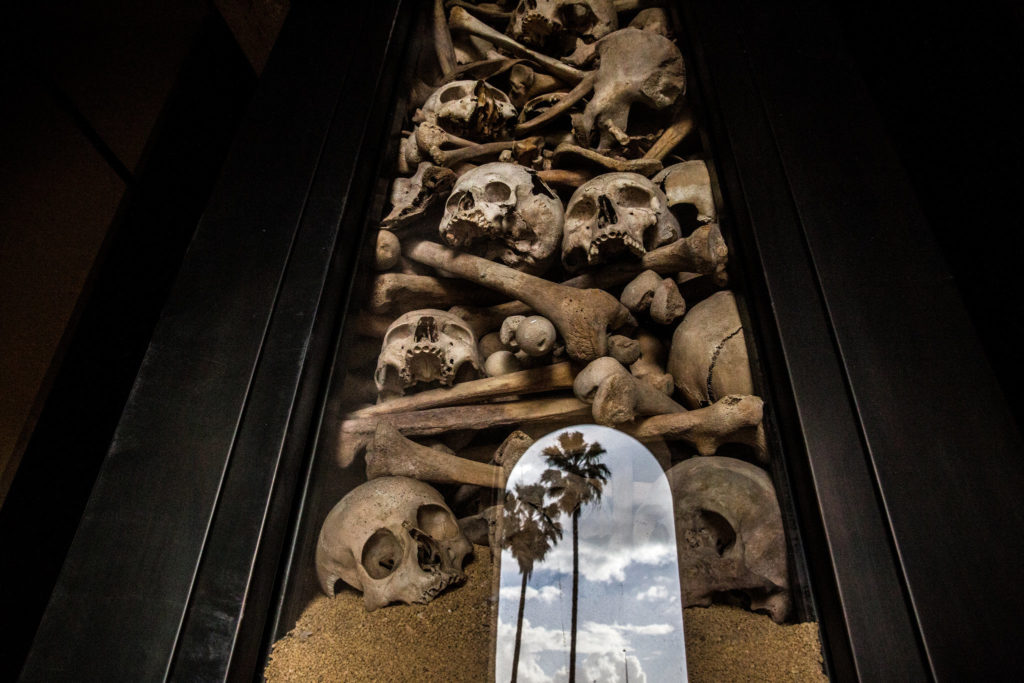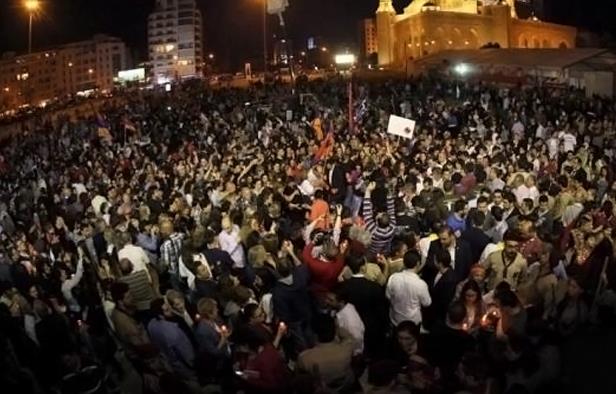For your freedom we have lived and for your independence we are dying.” —Abdul-Karim el-Khalil, with a rope around his neck, May 6, 1916.
Every year, Armenians all over the world — in Armenia and the diaspora — commemorate the anniversary of the genocide on April 24. On this day in 1915, around 400 Armenian intellectuals were arrested by the Turkish gendarmes and were all executed. The plan of the Central Committee of the Young Turks Party was simply to annihilate the Armenian nation and to create a Pan-Turkic Empire, which would extend from Istanbul to Central Asia. During this Genocidal campaign, around 1,500,000 Armenians perished and hundreds of thousands of Assyrians, Syriacs and Greeks were slaughtered. Henry Morgenthau, the US ambassador to Turkey who witnessed the massacre, quoted Ottoman ruler Talaat Pasha as saying, “What Sultan Abdul Hamid failed in 30 years, I have accomplished it in just 3 months.” The genocide was done.

Armenian Genocide Memorial, Antelias, Lebanon. Skulls of the Armenians brought from Der Zor.
This year, the Lebanese-Armenian committee of the 100th anniversary of the genocide organized a candle-lit march on the eve of the genocide’s Remembrance Day. It started from the Bourj Hammoud Municipality Square and headed towards Martyrs’ Square in Downtown Beirut. Thousands of people, young and old, lit the streets with their candles and shouted “Justice!” as they marched. By 9 pm, Martyrs’ Square was filled with both Lebanese-Armenians and non-Armenians, with Lebanese and Armenian flags, and guest speakers gave their speeches.
In his speech, former Interior Minister Ziad Baroud insisted that no matter what, the truth must be recognized, because denial can’t erase or heal the wounded memories of the Armenians. He added, “Today I see the tears of pride in the eyes of the young generation, the tears that you inherited from your grandparents.” The next guest speaker was Haigazian University President Rev. Dr. Paul Haidostian, who stated that although 99 years ago, Armenians were deported from their land, leaving behind their homes, properties, memories, history and were marched to the desert towards an ambiguous future, our ancestors didn’t lose hope. They founded and built new homes around the world. He ended his speech with the following: “Before 99 years, Armenians were scattered like ashes right and left in dark, but today, today my fellow people and youth, you have overcome on the dark, with the candles in your hands, you have lightened the Martyrs’ square, this square which was also covered with dark when the same criminals executed the (Lebanese) intellectuals.”
The commemoration ended as people placed their candles around the Martyrs’ statue.
Many people would ask, what’s the purpose of commemoration? Why remember something that occurred a century ago?
As a Lebanese-Armenian I used to think about this question at every commemoration and always remember that a nation that does not remember its history is doomed forever. But the genocide is much more than a history. It’s in our roots. We lost our land, families; a nation was destroyed, and its people driven to the desert. My grandparents came from Aintab to the Syrian Desert walking barefooted. They could have surrendered, couldn’t they? They could have been converted to Islam or “Turkified,” couldn’t they? They could have committed suicide, like my grandmother’s aunt who threw herself in the Euphrates River to protect herself from rape and terror… But many didn’t choose this path. Despite the terror and the abuse, they survived and were protected by our fellow Arab brothers.
This is why we still commemorate: because our ancestors struggled so that, today, our generation lives. As famous Armenian-American writer William Saroyan said, “Send them into the desert without bread or water. Burn their homes and churches. Then see if they will not laugh, sing and pray again. For when two of them meet anywhere in the world, see if they will not create a New Armenia.”
Yesterday as I was walking around Martyrs’ Square, I noticed a child playing with the sand on the ground. An old lady sitting next to the child told her friend, “You know, in the deserts, our mothers used to write Armenian letters on the sand so that we learn how to speak and write. We are proud that we have such a patriotic generation now; they will continue our fight, when we die our cause is within safe hands.” This is why we still remember and commemorate: so that the next generation sees justice and lives in dignity and freedom.
The Lebanese-Armenian community once again reminded the international community of the global silence towards the crimes that were perpetrated against their ancestors. Despite this, Turkish Prime Minister Recep Tayyip Erdogan was giving a speech denying the Armenian genocide, and instead insisting on the “shared pain” of Armenians and Turks. The response was quick and the Lebanese-Armenians responded to him loudly and reinsured the diaspora’s just demands: “Mr. Erdogan no more fake words…give us… our lands, we want our lands back.”
History has taught us that justice can’t be buried.
The article was originally published at NOWLebanon
24/4/2014
Yeghia Tashjian holds a B.A. in political science from Haigazian University in Beirut, Lebanon. He is a Lebanese-Armenian political activist, researcher, blogger and the founder of the New Eastern Politics forum/blog. Currently, he is the regional and communication officer of Women in War, a gender-based think tank and research assistant at the Armenian Diaspora Research Center-Haigazian University. You can follow the author on Twitter @yeghig.






